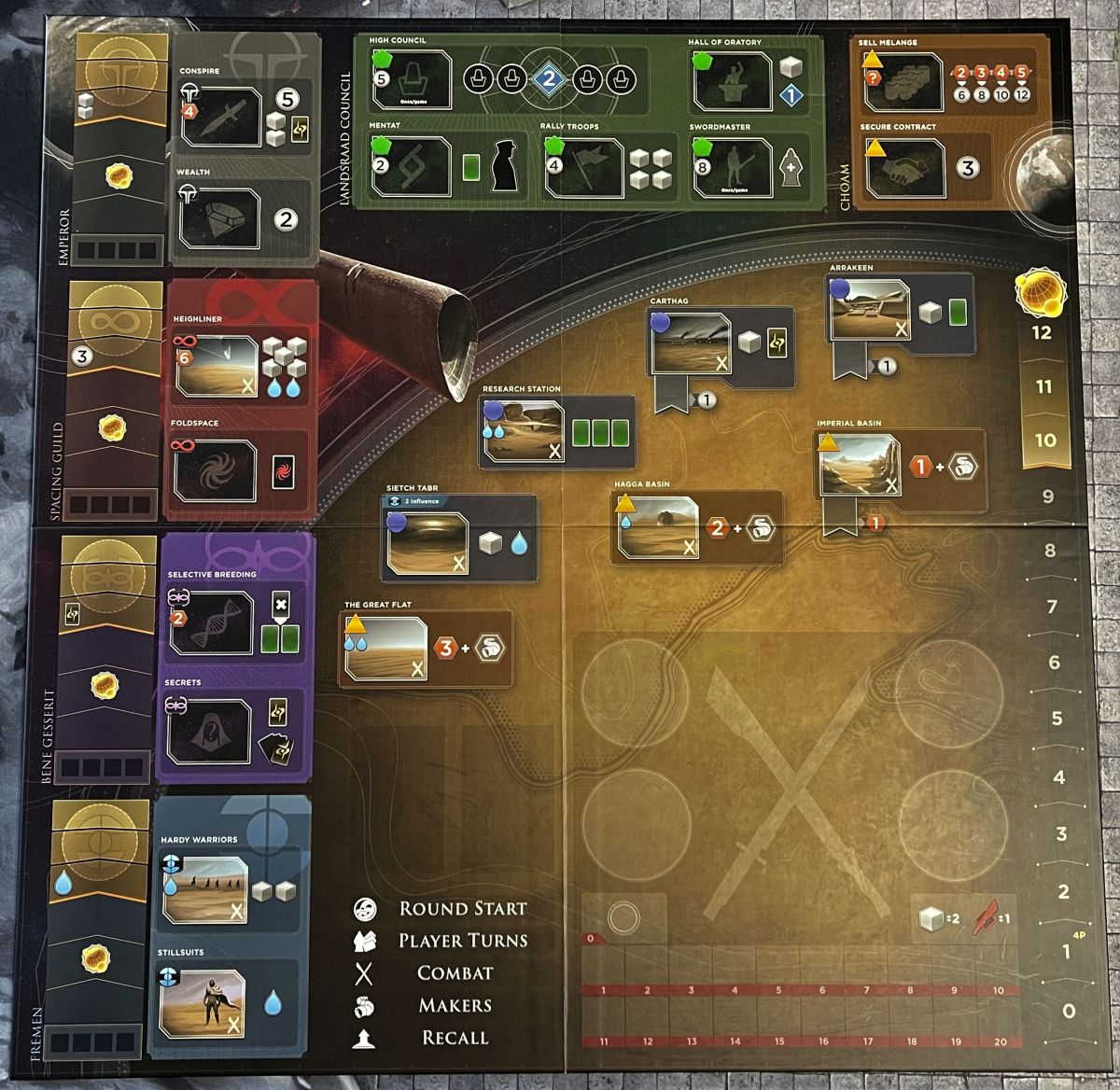“I should’ve suspected trouble when the coffee failed to arrive.”
The sand whips your skin, the bright sun burns, and there seems to be no escape from the heat. As a robed figure approaches, you look up from the windswept board, cards flying from your fingers, and ask, “Why are we playing in the desert again?”
Dune might not demand you play its games on Arrakis, but, of the many titles to share its setting, Dune and Dune: Imperium expect an appreciation for the desert planet, the spice that rests upon it, and the powers fighting for its riches.
Nevertheless, if the new movies, or the old books, have you wanting to try your own hand at riding the worms and slinging the spice, take a read and see which one works for you and your gaming group.
“The mystery of life isn’t a problem to solve, but a reality to experience.”
It takes a gaggle to run a galaxy, or so somebody may have said. Dune: Imperium gives you the chance to gather that gaggle by guiding your particular faction to victory. You’ll take charge with your cards and your worker pals, building a deck and dropping your best buddies onto spots around Arrakis and above it. Water, spice, and loyalty, among others, are currencies you’ll tangle with as you try to be the first to score ten points and trigger the end game. Oh, and every round there’s a battle between all your assembled mercenaries, boosted by intrigue cards players might be hiding.
That might sound like a lot, and if you’ve read Dune or seen the movies (either, really) you’ll know that matches the setting. But, unlike with Mr. Lynch, you’ll be able to make sense of Dune: Imperium pretty quick if you’ve played any worker placement games, particularly the similar Lost Ruins of Arnak. Like that exploration and deck-building game, Dune: Imperium gives you choice aplenty with a tight action economy. Choose a path, tailor strategy to match, avoid spreading thin like Leto Atreides.
able to make sense of Dune: Imperium pretty quick if you’ve played any worker placement games, particularly the similar Lost Ruins of Arnak. Like that exploration and deck-building game, Dune: Imperium gives you choice aplenty with a tight action economy. Choose a path, tailor strategy to match, avoid spreading thin like Leto Atreides.
What strategies might those be?
Well, for starters, you’ve four factions ready to aid your efforts, provided you show them some love along the way. Market cards boost loyalty for rewards, climbing a track for points and faction-specific bonuses. Drawn each round. Want cash and power? The Emperor’s your pal. Feeling thirsty, and wanting some special spaces only water can get you? The Fremen have your back.
Spice is key, bought or sold, converting to cash. Harvesting needs speed; spaces can be blocked. Snatch Fremen water.
Earn money to enhance council play, increase workers, hire mercenaries, or gain card-buying power. Beware rivals and Harkonnen’s moves.
The tension what gives Dune: Imperium its staying power. This isn’t a solitaire fest, as you’ll be fighting for loyalty, racing for victory points, and clashing in the  sands to see who comes out on top, and who finds their troops lost to the worms.
sands to see who comes out on top, and who finds their troops lost to the worms.
There’s a lot of worker placement and deck-building games out there, though, so why this one? What makes it special, like a Bene Gesserit prophecy?
First, there’s light asymmetry. Every player starts with their own faction leader, best dealt randomly or, if you’ve some experience, drafted. These help nudge your strategy from the start, letting you lean into the Harkonnen’s violence or Paul Atreide’s prophetic visions. Clever players manipulate leader expectations, bluffing for advantages and outplaying opponents in points and cards.
Second, the conflict phase is a rare smashing of player against player. While Dune: Imperium’s not an area control game—and it’s not trying to be—you’ll still sweat the round’s combat phase, wondering if the troops you committed will get you a victory point, some resources, or nothing at all with their lives. It’s harsh yet ignorable; success in other areas could secure victory despite its brutality.
And last, Dune: Imperium nails the theme. It’s branded with the new movie’s graphics, sure, but the game feels like Dune. There’s plenty of politics in the cards, in the taking (or not) of spots. Intrigue cards let you drop surprises on opponents too, just like the Emperor did on the poor Atreides family. You’ll manipulate or get entangled, embodying Frank Herbert’s sci-fi world of intrigue and power dynamics.
Dune: Imperium isn’t overstuffed with complexity either, though I’d not suggest it as the very first worker placement or deck-building game you try. Simpler options like Lords of Waterdeep, Dominion, or, keeping with science fiction, Clank! In Space offer introductions to the same mechanisms without being as cutthroat. That said, if Dune’s your jam, this one’s worth checking out.
If you’ve been reading this so far and nodding along because you’ve stomped around Arrakis more times than you can count, then make sure to keep an eye out for the two expansions, Dune: Imperium – Rise of IX and Dune: Imperium – Immortality. They bring variety, refresh a solid game, much like this next classic that stands strongly alone.
for the two expansions, Dune: Imperium – Rise of IX and Dune: Imperium – Immortality. They bring variety, refresh a solid game, much like this next classic that stands strongly alone.
“He who controls the spice controls the universe.”
Ever wandered through your game store and stopped, staring at Twilight Imperium’s big box while wondering how anyone could spend eight hours fighting their way across the stars? Well, with Dune by Gale Force Nine games, originally published in 1979 but updated in 2019, you can put that fantasy to bed. Cheaper, faster, but still playing up to six in a sandy slaughter, Dune zooms in on the conflict, turning Arrakis into an area-control map complete with sandstorms and backstabs.
Continuing the comparison to Twilight Imperium, though, does both games a disservice, as Dune embraces chaos with aplomb. Leaders, much like in Sekigahara, may not always be loyal, ready to sell out your ambitions for some delicious, life-extending spice. Your massive armies, raised with both cunning and craftsmanship,  might be blown away by a fickle sandstorm. Luck may swiftly determine victors. Allies shift win conditions, surprising foes and altering strategies abruptly.
might be blown away by a fickle sandstorm. Luck may swiftly determine victors. Allies shift win conditions, surprising foes and altering strategies abruptly.
Quirks challenge wargamers. Navigate rules for a unique experience. Factions clash, not just coexist, adding intrigue. Take, for example, the Spacer’s Guild, a player faction. They manage space, so moving troops requires payment, not from a bank but them. Treachery cards can assassinate someone’s leader or prevent the same, or give you nothing much at all. Spice scarcity penalizes, banishing errors to desert corners. Fierce battles leave no compromise, claiming Arrakis for none.
Dune isn’t an easy game to get to the table, but if you have the group for it, one willing to tame its idiosyncrasies over several sessions, you’ll find a gripping time waiting. And, at a price point far less than its competition, it’s worth a trek into the sands to try.
“Beginnings are such delicate times.”
There are other Dune titles around, from Dune – Betrayal to Dune: A Game of Conquest and Diplomacy, among others, many glossing on a Dune movie veneer to popular game styles like Coup and, well, the original Dune game we just discussed above. If you’re a big fan of Herbert, sandworms, or deserts, there’s a decent chance you can fill your collection with a Dune-themed version of just about any game. Which is, honestly, great!
chance you can fill your collection with a Dune-themed version of just about any game. Which is, honestly, great!
If I’m going to Arrakis, though, my journey’s going to come via Dune: Imperium. It’s slick, easier to teach, filled with theme, and offers expansions to build on if we want some extra . . . spice. A larger group, with time and a willingness to confront some radical design decisions, might find Gale Force Nine’s Dune an irresistible pull, one worth trying for those devoted Dune fans around your table. Either game will have you telling stories, not about the desert, but the people fighting for it.
Written by Adam Knight
Spinning stories and playing games under the direction of his two cats, Adam delights in the roll of the dice and a well-told tale. Find more of his adventures at Black Key Books.
[ More from Adam: Deluxify Your Board Games]

